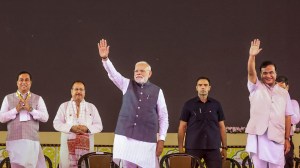Defending champ serena gets a sharp stunning blow
It was not the end of Maria Sharapova’s journey. At 17-years-old, she has only just begun to experience life and the delights and disad...

It was not the end of Maria Sharapova’s journey. At 17-years-old, she has only just begun to experience life and the delights and disadvantages that go with being a tennis star. But what happened on Center Court at Wimbledon on Saturday afternoon was certainly the end of the first stage of her journey; the one that began with her leaving Russia with her father, Yuri, and arriving uninvited and underfunded at Nick Bollettieri’s tennis academy in Bradenton.
She was just 7 then, too young to question any of it: the two years she would spend away from her mother, Yelena, as she waited for a visa to the United States; the afternoons away from her father as he juggled their new life and language; the training sessions and the road trips to tournaments.
Others have cracked in similar circumstances, discovering that they lacked the desire or the talent or the single-minded focus to keep swinging away.
But Sharapova, despite her tall and slender frame, is not one to crack, and if there were any doubts about her toughness or her talent, she dispelled them in one hour and 13 minutes on Saturday with her 6-1, 6-4 victory over Serena Williams of the United States.
Sharapova dispelled them by winning the toss and electing to serve in her first Grand Slam final. She dispelled them by winning five straight games to take the first set in a hurry; by cracking first serves, running forehands and crosscourt backhands; by pouncing on short balls and rolling topspin lobs over Williams’ head for winners.
And just in case there was still a smidgen of uncertainty about the quality of her nerve, she rose from her chair with a 5-4 lead in the final set with the tennis world and millions more casual observers paying close attention and served out the match against the powerful, intimidating player who has dominated Wimbledon for the past two years.
“It wasn’t my day today, but Maria played really good match,” said Williams, the No. 1 seed, in an on-court interview afterward.
Williams did not play badly. She made errors off her forehand, the powerful stroke that has given her trouble throughout this tournament. She did not return as effectively as she did when she was dominating the game in 2002 and 2003.
But her level on Saturday afternoon would probably have been good enough if Sharapova had played like a teenager who was too well aware that this was a breakthrough moment.
Instead, the Russian kept her cool and answered Williams’ baseline bolts with big shots of her own. Pace does not phase Sharapova, as she proved with her come-from-behind victory over the equally big-hitting American Lindsay Davenport in Thursday’s semifinals.
In truth, Sharapova’s big game is ideally suited to grass. She hits relatively flat, favors slice serves over high-kicking topspin serves, and clearly enjoys moving on a surface that leaves many modern players frustrated.
It remains to be seen whether that marked the end of an era or the beginning of another one.
For the first time since 1999, neither Serena nor her older sister, Venus, holds a Grand Slam singles title.
“I have to take this away for one year, I’m sorry,” Sharapova said to Serena as she held the gold-plated Venus Rosewater Dish that goes to the champion. “I’m know there are going to be so many more moments where we are going to play, and I’m sure we’re going to be here one more time, and hopefully many more times.”
Before arriving at Wimbledon, Sharapova had never advanced past the quarterfinals in a Grand Slam event, but she punched through that barrier here to become the second-youngest women’s winner in the Open era after Martina Hingis of Switzerland, who won the title in 1997 when she was 16. The only other younger champion was Charlotte “Lottie” Dod of Britain, who was 15 when she won in 1887.
But Sharapova is unquestionably a child of this generation, and she proved it by calling for her cell phone to be passed down to her from the players box as she waited on court for the victory ceremony, her victory ceremony, to begin.
She wanted to call her mother, who had watched the matches at their home in Bradenton. But she was unable to get through. Finding her father proved easier. All she had to do was climb in the stands, taking the trail blazed by men’s champion Pat Cash in 1987.
Yuri was with her when this part of the journey began, and he was overcome with joy as it ended, embracing and kissing his daughter again and again as Sharapova’s agent Max Eisenbud joined in as well as he could from a row above.
Photos





- 01
- 02
- 03
- 04
- 05

























